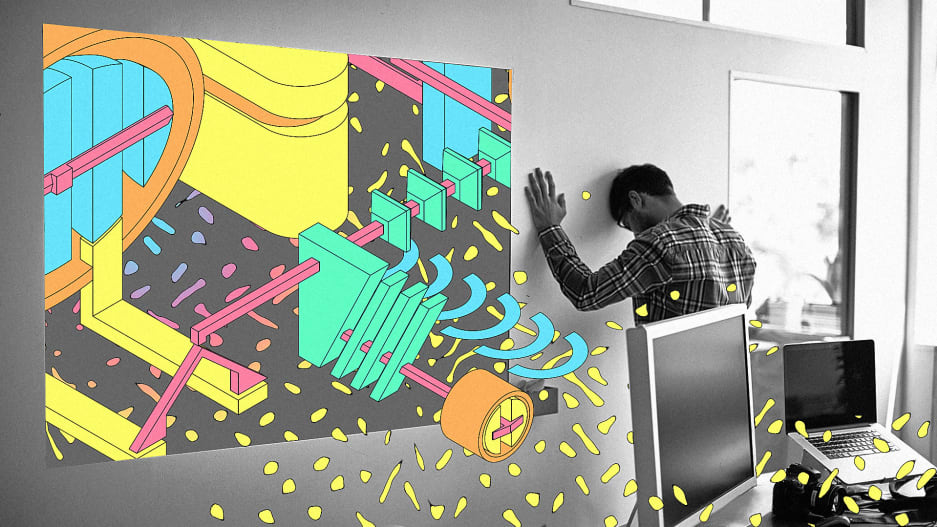
Ten pros share their tricks for staying engaged with your work.
Burnout can strike at unexpected moments, regardless of whether you’re your own boss or work with a team. We’re living in an era when round-the-clock communication is simply a fact of life, and the always-on culture of many workplaces can take an outsize toll on creatives, who need mental and physical energy to do their best work.
So, how do you avoid burnout? Co.Design collaborated with The Creative Independent, a resource for creative people with a deep archive of how-to guides and interviews, to bring you 10 takes from leading artists, designers, musicians, and chefs on what they do–or don’t do–to keep themselves sane, energized, and creatively fulfilled.
PLAN “SLOW-DOWNS” IN YOUR YEARLY CALENDAR
“The burnout thing is real. I went hard for the last year and a half. I ran a great Kickstarter, and had my first proper book come out, and then took it on a book tour, and traveled all over the place, and was gone constantly. It was lots of adventure, but also lots of hectic stuff, and that definitely took a toll. I psychologically told myself that I would stop, and somehow, it took me [many months of] pumping the brakes to actually feel like I was slowing down. I think as a freelancer, you fall into the trap of thinking that your time and your schedule is very flexible, and I’ve started to come to grips with the fact that it’s not. I have to set time aside a year in advance, and hold it sacred.”
Illustrator and cartoonist Lucy Bellwood on the pros and cons of being an independent creator

TREAT YOUR WORK LIKE A 9-TO-5 JOB, EVEN IF IT’S NOT
“I schedule out hours to work. I know that if I’m working during those hours, then I can have that night to myself to exercise or watch a TV show or read a book or whatever. That’s a difficult thing, because you want the record to do well and you have your management and your publicist and the label working to get you press opportunities, [so it can be hard to be like,] ‘I’m just not going to do this today.’ But, with the songwriting process, it’s really important because you don’t want to burn out. You don’t want to feel like you don’t enjoy playing music.”
Musician Alicia Bognanno on managing your creative time
FIND A TOTALLY UNRELATED CREATIVE OUTLET
“The only time I was really on my way to burning out was when I was working at fancy restaurants doing only desserts. That’s when I started playing music again after a few years of not doing that. Playing music helped me keep myself in check. I was able to do this other thing that balanced things out–something totally and completely different from my job.”
Chef, restaurateur, and musician Brooks Headley on how running a restaurant is like being in a band

TAKE A DAY OFF
“I’m very lucky because I’m able to do what I love every day, [and] I always feel like there’s something that I can take from life and sublimate into fiction. Of course, I have many days that feel like pulling teeth—like the worst dentistry. Days where I delete everything and start over. Taking one day off a week is good, so is going to a museum, or the galleries in Chelsea, or an afternoon movie, or walking around New York if the weather is in a good mood.”
Novelist Katherine Faw on not multitasking
WORK IN SPURTS, AND KEEP A RHYTHM
“I do very well under duress. My voice sounds better when I’m dehydrated and tired. So, burnout is actually okay when it happens. That’s why I live upstate; it’s a tank and a vacuum where I can go in for several weeks—get up at six, lunchtime, dinnertime, same time every day. Go to sleep at nine. An amazing amount can happen in three weeks, maybe a year’s worth of work.”
Artist and composer Sahra Motalebi on working without a map
PRACTICE SAYING “NO”
“I was definitely burnt out this past fall and it was rough. I’m learning the value of sleeping more. I’m learning the value of longevity and projects that take time. For me, something I’ve also been learning is how so many black women feel like we can’t say ‘no,’ or that we have to work extra just to prove our existence in a certain space. I’m trying to resist all of that.”
Curator Erin Christovale on curating

DON’T TREAT YOUR WORK LIKE SOMETHING YOU NEED TO ESCAPE FROM
“Honestly, the only time that I feel things start to spin out is when I buy into the whole ‘work really hard and then just don’t work at all’ idea. It’s the retirement model. It’s the ‘I’m trying to do as little work as possible model,’ which is unfortunately what happens to a lot of touring musicians. You come off the intensity of being on the road and then you want to just be the king of pina coladas on the beach for the three months. For me, the only time when I actually feel like my creative drive starts to wane is if I fall for that bullshit. I only burn out when people try to convince me that somehow this is a job that I don’t want.”
Musician Emily Haines on commitment
WORK ON MULTIPLE THINGS AT ONCE
“I think I avoid burnout by doing different things. Moving the headspace from one thing to another thing helps me keep moving. It becomes easier once you go away from something to go back into it. Like, with books. I’m not really a one-book-at-a-time person. Sometimes I’ll stop feeling like I’m enjoying a book, that I overall am enjoying, and I go look around somewhere else and then go back. I think that’s how I avoid the burnout. It more feels like coming back to something, and it’s different when I come back to it.”
Musician Greg Fox on doing things on your own

BE HONEST ABOUT WHEN YOU NEED A BREAK, AND THEN REALLYGIVE YOURSELF ONE
“I think it’s important to keep a schedule, a ritual even. Usually I can go long periods of time with a routine, then one day something will click and I’ll switch it up for a week. I think allowing for mistakes in your creative work is important. You’re allowed to give yourself a break when you need it. This will include for me: being in nature, being still in my own space, or writing ideas down instead of actually working on them.”
Visual artist and teacher Angela Pilgrim on creating work in your own voice
BE TRUE TO YOURSELF
“You have to feed yourself creatively. I hate using the term ‘self-care’ but I think that’s a part of it. Even if it’s just going to bed early. I think those little things you do for yourself can help. I also think being realistic helps . . . Eventually you just find the part of what you do that is evergreen and true and you focus on that.”
–
This article first appeared in www.fastcompany.com
Guest Author: CO.DESIGN AND THE CREATIVE INDEPENDENT.
